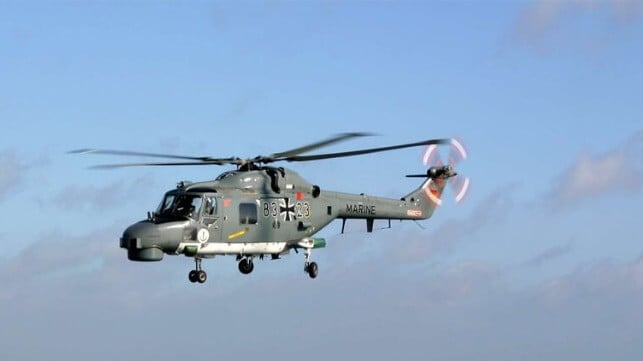Report: Russian Vessel Shot Signal Flare at German Helicopter

German media is widely reporting an incident in the Baltic between an unnamed Russian ship and a German military helicopter on patrol. Deutsche Presse-Agentur (DPA) broke the story today, December 4, based on comments from Germany’s Foreign Minister on the sidelines of the NATO meeting in Brussels which the organization says was designed to “chart a way forward in addressing Russian sabotage.”
According to DPA, the Minister mentioned that a Russian ship in the Baltic had targeted a German helicopter without supplying any specific details. The vessel, which in some reports is said to be a tanker, fired a signal flare at the German helicopter. It is unclear if the helicopter had taken any actions toward the tanker to provoke a response.
The German Defense Ministry later refused to confirm the report. However, Minister Annalena Baerbock cited it as an example of Russian and Chinese efforts in the region. She also pointed to the recent damage to two undersea data cables believed to have been caused by a Chinese cargo ship. Last year, another Chinese vessel was suspected of dragging and losing its anchor in the Baltic which resulted in damage to gas lines. The Minister also cited the jamming of GPS systems while saying NATO and the EU needed to do more to monitor and protect pipelines, data cables, and other critical infrastructure assets.
Baerbock according to DPA also referenced the volume of shadow tankers operating in the Baltic circumventing the Western sanctions on Russian oil. It is unclear from the report if it was a shadow tanker that fired the flare but Denmark and other nations have long worried about the dangers of the shadow tanker fleet.
Hours after the report of the incident with the German helicopter, NATO Foreign Ministers announced a new agreement among NATO and its allies to protect critical infrastructure. NATO General Secretary Mark Rutte said they were working to counter Russia’s actions against NATO citing acts of sabotage carried out by both Russians and the Chinese.
“NATO will work closely together with the EU on these issues,” Rutte said in a statement at the end of the two days of meetings. He reported agreement among the ministers for a set of measures to counter Russia’s hostile and cyber activities.

that matters most
Get the latest maritime news delivered to your inbox daily.
Among the steps that NATO reports the members agreed to are enhanced intelligence exchange, more exercises, better protection of critical infrastructure, and improved cyber defense. He also said they would take “tougher action against Russia’s ‘shadow fleet’ of oil exporting ships.”
Rutte noted that continued support for Ukraine is a priority for NATO. He said it is ensuring that, when the time comes, Ukraine can negotiate peace from a position of strength. He further highlighted how NATO is delivering on its commitments and will increase efforts to protect European interests.
